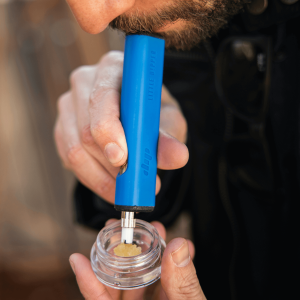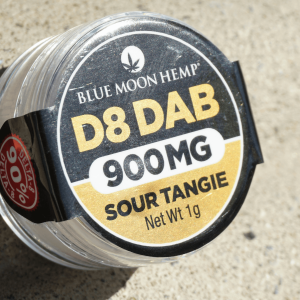THCa Distillate is the future. And while we know that’s a huge statement, hear us out…
THCa is increasingly sought-after in the emerging hemp scene, catching the eye of both everyday stoners and new consumers alike. Tetrahydrocannabinolic acid (THCa) acts as the non-psychoactive precursor to THC, present in raw and live cannabis plants.
By going through a careful distillation process, THCa gets separated and concentrated into a potent and versatile distillate concentrate. This method not only showcases the purest THCa but also significantly trims down the presence of other compounds, resulting in a product that’s almost pure THCa.
The growing hype around THCa distillate can be linked to its adaptability, strength, and the increasing curiosity surrounding hemp. In this blog, we’ll dive into the distinctive qualities of THCa, the detailed distillation process, and the reasons fueling the surge in interest for THCa distillates.
Let’s begin!
What is THCa?
THCa is a cannabinoid naturally present in the cannabis plant. Unlike the well-known THC (Tetrahydrocannabinol), THCa is non-psychoactive, so it won’t give you that “high” feeling from cannabis in its raw form. The key difference between THCa and THC comes down to their chemical makeup and how they affect your body.
THCa is present in the raw cannabis plant and serves as a precursor to THC. When cannabis is heated, through smoking, vaping, or cooking, THCa undergoes decarboxylation – a chemical reaction that removes a carboxyl group from THCa, converting it into THC. This process is what activates THCa’s psychoactive effects.
In its raw form, THCa has its own set of potential health benefits, including anti-inflammatory and neuroprotective properties. Its presence in the raw cannabis plant plays a significant role, not only as the precursor to THC but also contributing to the plant’s overall cannabinoid profile.
The Process of Creating THCa Distillate
Creating THCa distillate involves a very specific process that transforms raw cannabis into a pure, potent concentrate.
Here’s a step-by-step breakdown of how THCa distillate is made:
- Extraction: The process begins by extracting the raw cannabis material to obtain a raw extract. This involves using solvents such as CO2, ethanol, or hydrocarbons to separate the cannabinoids and terpenes from the plant matter.
- Winterization: Next, the raw extract undergoes winterization, a method that removes fats, waxes, and lipids. This is achieved by dissolving the extract in ethanol and then subjecting it to freezing temperatures.
- Filtration: After winterization, the mixture is filtered to remove the precipitated impurities, leaving behind a more refined extract.
- Decarboxylation: Before distillation, the extract needs to be decarboxylated. This process involves heating the material to activate the THCa, converting it from its acidic form to its psychoactive form, THC.
- Distillation: Lastly, the refined extract is subjected to distillation under vacuum pressure. This step separates the THCa based on their boiling points, allowing for the isolation of a highly pure and potent THCa distillate.
Temperature control is super important throughout this process, especially during decarboxylation and distillation. Precise temperature regulation ensures the activation of THCa without degrading the product, maintaining its potency and purity.
It is this careful attention to temperature that gives THCa distillate its superior purity and potency, setting it apart in the market for its incredible concentration of THCa, minimal presence of other compounds, and unrivaled efficacy.

Benefits of THCa Distillate
THCa distillate is pretty amazing, not just for its purity and strength, but also for the variety of benefits it brings to consumers and patients seeking specific therapeutic and non-psychoactive effects.
Here are just a few of the advantages:
Medical Benefits
One of the most significant aspects of THCa is its potential medical benefits. Research suggests that THCa has anti-inflammatory and neuroprotective properties, making it a natural option for patients dealing with conditions like arthritis, neurodegenerative diseases, and inflammation-related issues.
Additionally, its medicinal properties extend to areas such as pain relief, and it may even have growth-inhibiting qualities, which are being studied in the context of cancer therapy.
Non-Psychoactive Benefits
For consumers seeking the therapeutic benefits of cannabis without the psychoactive effects associated with THC, THCa distillate may just be the solution.
Since THCa does not produce the “high” that THC does (unless it is heated), users can incorporate it into their daily regimen without worrying about getting high. This aspect is especially valuable for patients who need to remain clear-headed while still benefiting from cannabis.
Versatility in Consumption Methods
The adaptability of THCa distillate is another huge advantage. It can be consumed in various ways, including edibles, topicals, and inhalation. This versatility means that consumers can choose the method of consumption that best suits their preferences and needs.
Whether it’s incorporating THCa into a topical cream for localized relief, adding it to edibles for a slow-release effect, or inhaling it for more immediate results, the options are extensive. This flexibility enhances the appeal of THCa distillate, making it a preferred choice for a wide range of both recreational and medicinal users.
Ways to Consume THCa Distillate
THCa distillate is incredibly versatile and can be consumed in a variety of different ways.
Here are a few of our favorites:
Dabbing
Dabbing is a super efficient way to enjoy THCa distillate, perfect for those looking for quick effects. Just dissolve a bit of distillate on a hot surface and breathe in the vapor.
Dabbing is typically preferred by experienced users due to the control it offers over dosage and the rapid onset of effects.
For those interested in the purity and potency of THCa without the high, dabbing at a lower temperature can prevent decarboxylation, delivering the benefits of THCa directly into the system.
Incorporating THCa into Edibles
Edibles offer a discreet and convenient way to consume THCa distillate. By incorporating THCa distillate into recipes, users can enjoy the therapeutic benefits over a prolonged period.
This method is particularly suitable for those seeking a sustained release of effects, such as pain relief or anti-inflammatory benefits.
Topical Applications for Localized Relief
Topical applications of THCa distillate target specific areas of the body for relief. By adding THCa distillate to lotions, creams, or balms, you can apply them directly to your skin for local absorption.
This approach works well (under a doctor’s advice) for addressing a medical condition that may promote pain, inflammation, or skin issues. It provides the benefits of THCa without affecting the whole body, making it a safe choice for those seeking targeted relief.

The Legal Landscape of THCa Distillate
Navigating the legal scene of THCa distillate can get a bit tricky, given the varying status it holds in different regions.
In some areas, THCa distillate falls into a grey area due to its non-psychoactive nature when not heated, distinguishing it from THC. This distinction is crucial in a governing state where laws differentiate between hemp-derived cannabinoids, like CBDa, and those associated with psychoactive effects, such as THC.
With that being said, it’s important to note that THCa is completely legal in the United States under the 2018 Farm Bill, which removed hemp as a controlled substance. Due to this policy, hemp THCa can be legally sold across the country so long as it contains less than 0.3% Delta 9 THC on a dry weight basis.
The legality of THCa is often linked to how cannabis is viewed in a specific area, affecting availability and research possibilities. With more places legalizing cannabis, it’s now easier to explore THCa, its advantages, and its applications. Not to mention, it’s easier than ever to purchase hemp from online retailers.
Future of THCa in the Cannabis Industry
The cannabis industry is right on the edge of a major evolution, and THCa is leading the way! Exciting research into THCa is revealing several possible medical and therapeutic uses for customers, marking the start of a fresh era for cannabis-based medicines and treatments.
Consumer demand is also shifting, with an increasing number of users seeking the health benefits of cannabis without the psychoactive effects, driving interest in relatively non-psychoactive options like THCa. This trend is likely to expand the market for THCa products, from edibles and topicals to prescription medications.
The potential of THCa to soothe inflammation, combat neurodegenerative diseases, and maybe even inhibit cancer cell growth brings exciting possibilities for pharmaceutical research and development. As legal landscapes evolve to be more cannabis-friendly, the future of THCa in the cannabis industry looks not just promising, but also key in bringing in a new era of innovation and acceptance.
Conclusion
The discovery of THCa distillate uncovers its exciting potential within both cannabis culture and medicine. With its non-psychoactive nature and significant therapeutic benefits, THCa stands out as a key player in the evolving cannabis story.
From dabbing to topical applications, the various consumption methods highlight its intended adaptability to treat individual needs. Looking ahead, the growing acceptance and research into THCa’s medical uses promise an exciting shift towards mainstream cannabis products.
It’s no secret that THCa distillate offers several health benefits, reshaping perceptions and paving the way for cannabis to shine in holistic health and medical innovation.

Frequently Asked Questions
1. Can THCa Cause a High?
No, THCa by itself does not cause a high. It is the non-psychoactive precursor to THC, which means it must undergo decarboxylation (a process of heating) to convert into THC, the compound known for its psychoactive effects. Consuming THCa in its raw form, therefore, does not lead to the euphoric sensations associated with THC.
2. Is Distillate Stronger Than Live Resin?
Yes, distillate can be considered stronger than live resin in terms of THC content. THCa distillate is highly refined and can have a purity of over 90% THCa, which, when decarboxylated, can transform into a very high concentration of THC. Live resin, on the other hand, preserves a broader spectrum of cannabinoids and terpenes, providing a more complex experience but generally lower THC levels.
3. Does THCa Test Positive?
Yes, if THCa is decarboxylated into THC, it can cause a positive drug test for THC. While THCa itself might not always be detected, the process within your body that converts THCa to THC could contribute to a positive test result for THC.
4. How Do You Make Diamonds With THCa?
Making THCa diamonds involves a process called crystallization. It typically starts with a cannabis extract that is high in THCa, which is then subjected to a combination of heat, pressure, and time. This process allows THCa molecules to bond together, forming crystal structures known as “diamonds.” The exact method can vary, and creating THCa diamonds is complex, often requiring precise equipment and conditions.
5. Can I purchase THCa Distillate Online?
Yes, it is possible to purchase THCa distillate online through Hyperwolf’s hemp delivery. We offer a selection of THCa distillate products that can be conveniently ordered from the comfort of your home — and with free priority shipping on overs over $75.
6. Can I use THCa distillate for medical purposes?
Yes! THCa is known for its potential medical benefits. However, please note that if you are using THCa distillate to treat a medical condition, we suggest you consult with a doctor as these products are not meant to treat, cure, or prevent disease.

 Rewards
Rewards





